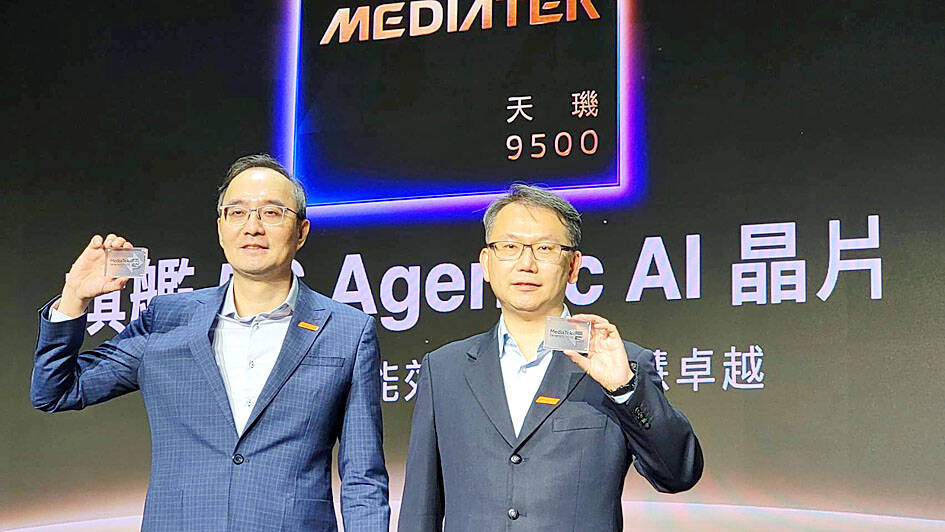MediaTek Inc (聯發科), the world’s largest handset chip designer, yesterday said its strategic collaboration with Nvidia Corp is on track and expected to bear fruit within two to three years, easing concerns over Nvidia’s newly announced partnership with Intel Corp to develop PC chips.
MediaTek shares fell 2.43 percent to NT$1,405, underperforming the TAIEX’s 1.18 percent gain, as investors worried that Nvidia’s work with Intel might overshadow its joint PC-chip projects with MediaTek based on Arm Holdings PLC’s architecture.
“We are quite complementary to one another in terms of product and technology,” MediaTek president Joe Chen (陳冠州) told reporters during the launch of the company’s new flagship Dimensity 9500 smartphone chip.

Photo: Vanessa Cho, Taipei Times
“Our cooperation is not limited to one single product, but covers end devices powered by Arm-based compute [technology], cars and even cloud-based NVLink-related [products],” Chen said. “The cooperation is progressing quite well and is following our original schedule. We believe the cooperation will bear fruit in the next two or three years as expected.”
As for Intel, MediaTek’s cooperation is focused on foundry services using less advanced technologies, with some products still in development, senior vice president J.C. Hsu (徐敬全) said.
Taiwan Semiconductor Manufacturing Co (TSMC, 台積電) continues to be MediaTek’s key foundry partner for advanced processes, including its forthcoming 2-nanometer technology, the chip designer said.
MediaTek is also preparing to use TSMC’s Arizona plant to produce chips, as some US customers prefer domestically made components for cars or other sensitive products, Hsu said.
Customers are also weighing imminent US semiconductor tariffs, he said.
The company said its new Dimensity 9500 is among the first mobile chips built on TSMC’s 3-nanometer process, featuring advanced artificial intelligence (AI) capabilities.
MediaTek’s Chinese customer Vivo Communication Technology Co (維沃) yesterday announced it would launch its Vivo X300 series in November in Taiwan, powered by the Dimensity 9500.
The new chip has been adopted by most Android smartphone makers, including Samsung Electronics Co, reinforcing its 40 percent share of the global mobile chip market, MediaTek said.
The company aims to lift its flagship mobile chip’s market share to match its overall 40 percent share of the global handset market, capitalizing on rising flagship smartphone sales worldwide.
MediaTek expects global smartphone shipments to grow only 1 to 2 percent annually amid sluggish economic conditions, Hsu said.
In China, government subsidies spurred some early pull-in demand, but have so far failed to boost new demand, he said.
Worldwide growth next year is likely to mirror this year’s pace, at an annual rate of 2 percent, he added.

Macronix International Co (旺宏), the world’s biggest NOR flash memory supplier, yesterday said it would spend NT$22 billion (US$699.1 million) on capacity expansion this year to increase its production of mid-to-low-density memory chips as the world’s major memorychip suppliers are phasing out the market. The company said its planned capital expenditures are about 11 times higher than the NT$1.8 billion it spent on new facilities and equipment last year. A majority of this year’s outlay would be allocated to step up capacity of multi-level cell (MLC) NAND flash memory chips, which are used in embedded multimedia cards (eMMC), a managed

CULPRITS: Factors that affected the slip included falling global crude oil prices, wait-and-see consumer attitudes due to US tariffs and a different Lunar New Year holiday schedule Taiwan’s retail sales ended a nine-year growth streak last year, slipping 0.2 percent from a year earlier as uncertainty over US tariff policies affected demand for durable goods, data released on Friday by the Ministry of Economic Affairs showed. Last year’s retail sales totaled NT$4.84 trillion (US$153.27 billion), down about NT$9.5 billion, or 0.2 percent, from 2024. Despite the decline, the figure was still the second-highest annual sales total on record. Ministry statistics department deputy head Chen Yu-fang (陳玉芳) said sales of cars, motorcycles and related products, which accounted for 17.4 percent of total retail rales last year, fell NT$68.1 billion, or

In the wake of strong global demand for AI applications, Taiwan’s export-oriented economy accelerated with the composite index of economic indicators flashing the first “red” light in December for one year, indicating the economy is in booming mode, the National Development Council (NDC) said yesterday. Moreover, the index of leading indicators, which gauges the potential state of the economy over the next six months, also moved higher in December amid growing optimism over the outlook, the NDC said. In December, the index of economic indicators rose one point from a month earlier to 38, at the lower end of the “red” light.

The global server market is expected to grow 12.8 percent annually this year, with artificial intelligence (AI) servers projected to account for 16.5 percent, driven by continued investment in AI infrastructure by major cloud service providers (CSPs), market researcher TrendForce Corp (集邦科技) said yesterday. Global AI server shipments this year are expected to increase 28 percent year-on-year to more than 2.7 million units, driven by sustained demand from CSPs and government sovereign cloud projects, TrendForce analyst Frank Kung (龔明德) told the Taipei Times. Demand for GPU-based AI servers, including Nvidia Corp’s GB and Vera Rubin rack systems, is expected to remain high,